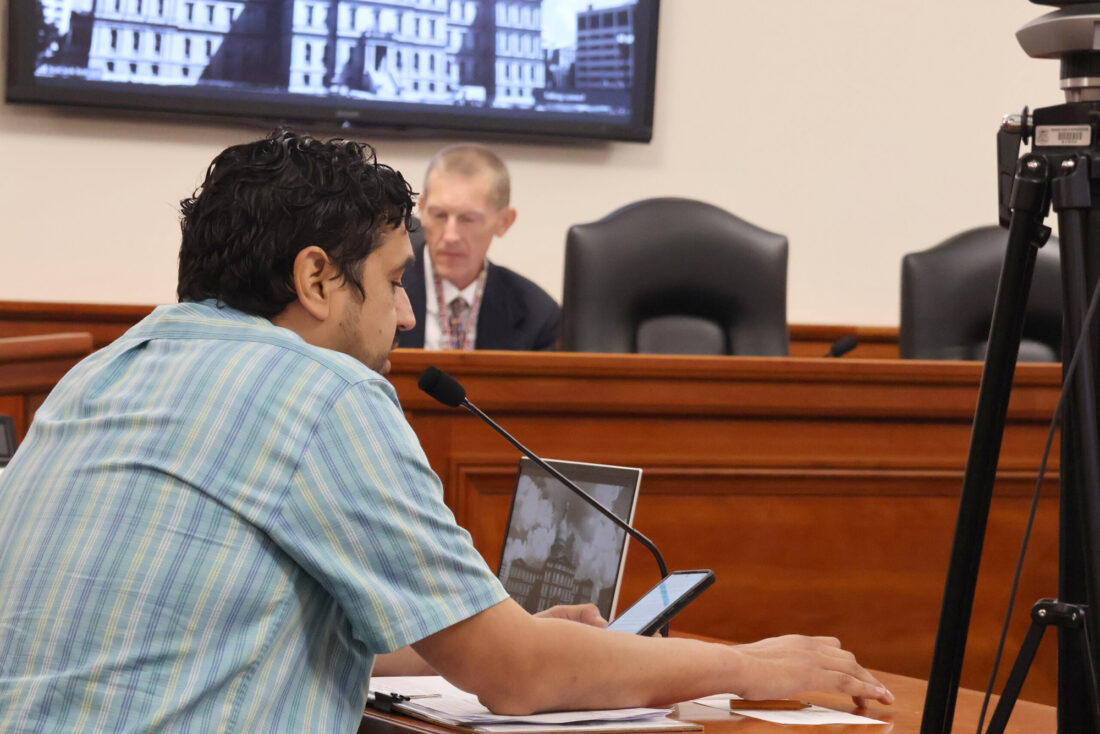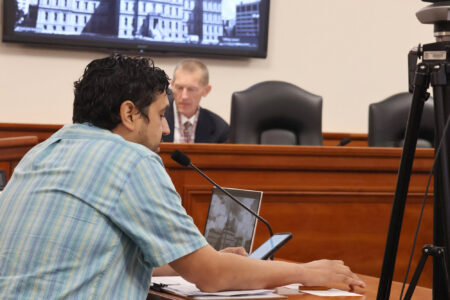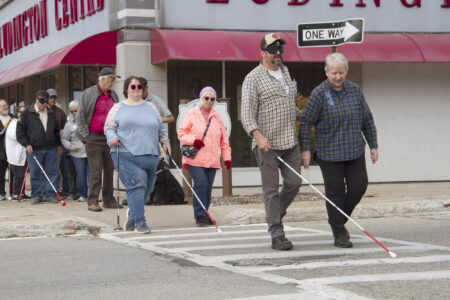County clerks unanimously oppose ranked choice voting in Michigan

Joe Spaulding, campaign director for Rank MI Vote, testifies Aug. 19 at the state Capitol in Lansing against legislation to ban ranked choice voting in Michigan. (Kyle Davidson/Michigan Advance)
The Michigan Association of County Clerks has unanimously voted to oppose a ballot measure seeking to establish ranked choice voting in Michigan, which is being put forth by Rank MI Vote for potential inclusion in the 2026 election.
The clerks cited concerns about timeliness of the certification of elections, confusion by voters and delays to any recounts or audits in their opposition to the measure.
“Michigan voters are used to knowing who won an election in a timely manner, so it’s incredibly important that we’re able to report accurate, unofficial results on election night,” Kent County Clerk Lisa Posthumus Lyons said in a news release from the association. “Determining a winner will take drastically longer under ranked-choice voting. Delayed results erode the public’s trust by fueling uncertainty and misinformation.”
Marquette County Clerk Linda Talsma, who chairs the association, also noted in the release that while they do not generally take positions on ballot measures, the bipartisan group of county officials felt it necessary to urge voters to reject the initiative in this case.
“Michigan voters already face some of the longest and most complex ballots in the nation, covering federal, state, county, city, township, school and special district contests on a single ballot,” reads the official resolution passed by the clerks’ association. “The RankMIVote proposal would further complicate ballots by requiring voters to numerically rank candidates in certain contests while others remain unchanged, adding inconsistency, voter confusion, and voter fatigue.”
The resolution also cited a survey, conducted in June by The Glengariff Group, in which 65% of Michigan voters polled — across demographic and political lines — opposed the implementation of ranked choice voting.
But proponents of the initiative pushed back against these criticisms. A statement from Rank MI Vote in response to the clerks’ statement cited that “upwards of 96% of voters found their ballot simple to complete,” adding that “79% of jurisdictions using RCV release results within 24 hours of an election.”
“Ranked Choice Voting has been proven to increase both the demographic diversity and diversity of ideas in the candidates who run and win elections,” said Joe Spaulding, the campaign director for Rank MI Vote, in the release.
Spaulding also criticized the timing of the announcement, which came on the same day as the U.S. Supreme Court is hearing a case that could undercut a key clause of the Voting Rights Act.
“If we set election policy based on the misplaced notion that voters are confused by having more choices instead of the fact that voters are angry when they have fewer choices, turnout will decline,” he added. “This is an outcome we know clerks want to avoid.”
One additional concern raised by the clerks is a potential constitutional conflict with straight-party voting, which Rank MI Vote says would not be affected by the inclusion of ranked choice voting, nor would the primary system in place.
The proposal put forth by Rank MI Vote would establish the new voting system in federal elections for President, Senate and House of Representatives, as well as state elections for Governor, Lieutenant Governor, Attorney General and Secretary of State, starting in 2029.
Five Michigan municipalities — Ann Arbor, East Lansing, Ferndale, Kalamazoo and Royal Oak — have individually passed ranked choice voting measures. But none have been able to put them into practice due to conflicts with current Michigan election laws.
Ranked choice voting is already being used in a number of states and cities around the United States — Maine and Alaska have both adopted the practice for certain elections, including the U.S. House of Representatives and U.S. Senate, and cities like New York City, San Francisco and Minneapolis have begun to use it for some citywide elections.
While this ballot initiative continues, Republicans in Michigan’s Legislature have also considered banning ranked choice voting in the state outright, passing a bill through the House in August along party lines that would do just that.
As of March 2025, Ballotpedia reported that 13 states had enacted legislation banning ranked choice voting, and another five failed in 2024 to pass ballot measures that would have put the system in place.
———
Michigan Advance is part of States Newsroom, a national 501(c)(3) nonprofit. For more, go to https://michiganadvance.com.




